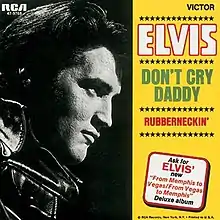Don't Cry Daddy
"Don't Cry Daddy" is a 1969 song recorded by Elvis Presley written by Mac Davis. The song was paired with "Rubberneckin'" and both peaked at number six in the United States Billboard Hot 100 chart in January 1970.[1]
| "Don't Cry Daddy" | ||||
|---|---|---|---|---|
 | ||||
| Single by Elvis Presley | ||||
| B-side | "Rubberneckin'" | |||
| Released | November 11, 1969 | |||
| Recorded | January 15, 1969 | |||
| Studio | American Sound Studio, Memphis, Tennessee | |||
| Genre | Country rock | |||
| Length | 2:43 | |||
| Label | RCA Victor | |||
| Songwriter(s) | Scott Davis | |||
| Producer(s) | Chips Moman | |||
| Elvis Presley singles chronology | ||||
| ||||
Background
The song was written by Scott Davis (also known as Mac Davis) and recorded by Elvis Presley on January 15 and 21, 1969 and released as a single. The rhythm track was laid down on 15 January and Elvis' vocal overdub on the 21st. The song reached #6 in the U.S.[2] and #8 in the U.K.
Live recordings were made during his second season in Las Vegas during February 1970 and several of these have been released. However, during the dinner show on 13 August 1970 at the International Hotel he recorded a version that led seamlessly into "In the Ghetto".
Duet
In 1997 Lisa Marie Presley made a video of "Don't Cry Daddy", where she sings it as a duet with her father. This video was presented on August 16, 1997, at the tribute concert that marked the 20th anniversary of Elvis' death. The video has Elvis' original vocal, to which new instrumentation and Lisa Marie's vocals were added. The recording was not for commercial use. The song created a renewed interest in her as a recording artist, displaying as it did the husky timbre in her voice.
Concept
The song takes place in the mind of the husband of the wife and mother who is no longer present. (It is not stated in the lyrics whether her absence is due to death, marital separation, divorce or abandonment). The characters are the father, one of his unnamed children, and a young child named Tommy. The unnamed child begs the father not to cry, saying they will find a new "mommy", and urges the father to play with the children as they did in happier times.
References
- https://www.billboard.com/charts/hot-100/1970-01-31
- [Joel Whitburn's Top Pop Singles 1955-2002]
